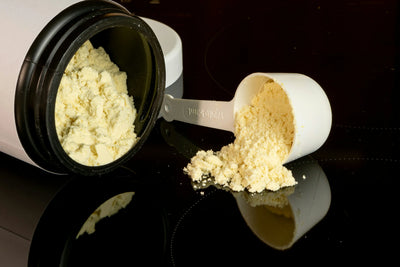Introduction
In the world of pet care, more and more dog owners are starting to look at natural herbs with curiosity, hoping to use nature's gifts to bring their dogs a healthier and more comfortable life. Peppermint, a tiny plant that exudes freshness, is often seen as a symbol of healthy living due to its unique aroma and diverse uses. However, when we introduce mint into the world of dogs, it's not as simple as we thought - it can be a blessing for dogs, but it can also be a hidden risk.
Peppermint for Dogs: A Natural Gift and a Careful Balance
Today, we're going to talk about peppermint for dogs, taking a look at the potential benefits, recommendations for use, and considerations that shouldn't be overlooked. We hope that this article will help you to be surprised by the benefits of natural remedies, as well as to have peace of mind when it comes to your dog's health.

1. The Safety of Peppermint
When you think of peppermint, you probably think of the refreshing taste or the lush green accent in your kitchen. But for dogs, peppermint is not the “all welcome” family. The mint family is very diverse, and different varieties can have different effects on dogs, so we need to find out which ones are friends and which ones are “invisible enemies”.
Safe Peppermints
Spearmint and Peppermint are “friendly neighbors” for dogs. Whether the leaves are fresh or dried and crushed, they are not only harmless, but also beneficial when used in moderation. They are like nature's little gifts to dogs, gentle and useful.
Toxic mint
Pennyroyal is a big no-no for dogs. This sounds like a “good insect repellent”, but in fact it is a hidden “health killer”. Whether accidentally ingested by dogs or applied to the skin, it can cause serious liver damage or even liver failure, which is unthinkable.
Wintergreen is also easily misunderstood. Although it's often thought of as a “distant relative” of peppermint, it's actually toxic to dogs and should not be touched.
So before you try mint on your dog, keep your eyes open, read the name on the package, or simply sniff or check to make sure it's a safe green mint or peppermint to serve to your dog.
2. 7 Benefits of Peppermint
Once you've chosen the right safe peppermint, there are quite a few benefits it can provide for your dog. Here are seven that may impress you with this little green plant.
Dogs exhale odors that sometimes make people back off? The fresh aroma of mint can help a lot. Not only does it make your dog's breath fresh and pleasant, it also reduces oral bacteria and indirectly prevents gum problems. Imagine how healing the light minty scent is when your dog comes over to you with his tail wagging!
Dogs can't escape the little nuisances of flatulence and bloating. Peppermint's natural anti-inflammatory properties act as a gentle “gastrointestinal masseuse” to help ease these discomforts and keep your dog's tummy comfortable.
Fleas and ticks are your dog's worst enemy in the summer, and peppermint's strong scent acts as an invisible barrier that keeps these little nuisances at bay. Much more gentle and environmentally friendly than chemical repellents, peppermint is worth a try.
If your dog can't help scratching, the cooling sensation of peppermint can come in handy. It soothes itchy skin and minor irritations, and can be a lifesaver during the summer months, especially for dogs with allergic skin problems.
Dogs can also be anxious about moving, thunder, or traveling long distances. The aroma of peppermint has a calming effect on dogs, allowing them to relax and face these “doggy challenges” calmly.
Peppermint's expectorant properties also help clear mucus from the respiratory tract, especially during colds and the change of seasons, helping them breathe more easily and doubling their energy.
Peppermint is rich in antioxidants and a variety of nutrients that can “recharge” your dog's immune system, so they will have the strength to fight off illnesses and accompany you through more springs, summers, autumns and winters.
Although mint is good, but also can not be stuffed all the way to the dog. Master the correct way to use, in order to let it really become the dog's “health assistant”.
Take one or two fresh green mint or peppermint leaves, gently chop them up and sprinkle them in your dog's food bowl once or twice a week. It's easy and safe, so your dog will enjoy it and you'll save money. It's also a good idea to make some herbal tea for your dog with mint leaves. Remember not to add sugar though, keep it plain and try it in small amounts.
Stay away from mints and gum. These favorite human snacks can be “poison” for dogs. They often contain xylitol, a deadly ingredient for dogs, so don't let them touch them.
Is Peppermint Oil Bad for Dogs?
When looking for a more natural and healthy lifestyle for their dogs, many dog owners are turning to herbs. Peppermint oil, a cool-smelling essential oil, is often considered a “natural remedy” because of its unique aroma and variety of uses. However, when it comes to introducing peppermint oil to our dogs, things get complicated - is it a blessing or a potential “hidden crisis”? Today, we're going to take a closer look at the topic “Is peppermint oil bad for dogs?” Today we're going to delve into the topic of “Is peppermint oil bad for dogs?”, talk about the potential harms and benefits, and share some practical advice. We hope that this article will help you embrace the gift of nature and have more peace of mind when it comes to your dog's health journey.
1. Potential Hazards of Peppermint Oil
Peppermint oil, especially peppermint oil, is a pleasantly scented companion in human life, but in the world of dogs it can become a “troublemaker” that requires vigilance. Dogs' bodies and metabolic systems are very different from those of humans, and they are more sensitive to peppermint oil than we realize. Here are three major risks that peppermint oil can pose to dogs, each of which is worth keeping an eye out for.
Toxicity Risks
Peppermint oil, if accidentally ingested in large quantities by dogs, can have more serious consequences than we realize. Especially undiluted, highly concentrated peppermint oil, which contains menthol and other ingredients, is a “big test” for your dog's liver and nervous system. Dogs' liver metabolism is far inferior to that of humans, so if they overdose, they may experience vomiting, diarrhea, tremors, or even more serious symptoms of coma. Imagine, you just want to bring a little refreshing to the dog, but accidentally let it into a crisis, this kind of heartbreaking picture who do not want to see.
Skin Irritation
The cooling sensation of peppermint oil can be enjoyable for humans, but it can be “a disaster” for your dog's skin. If you apply undiluted peppermint oil directly to your dog's body, their skin may become red, swollen, itchy, or even trigger an allergic reaction. Especially those who are born with sensitive skin, peppermint oil is like a “restless guest”, the slightest mistake may make them scratch and suffer.

Noora Skin & Coat Health Supplement
Respiratory Problems
Dogs' sense of smell is tens of thousands of times sharper than that of humans, and the strong, fresh odor of peppermint oil can be a “sensory bombardment” for them. If exposed to high concentrations of peppermint oil for a long period of time, dogs may feel dizzy, uncomfortable, or even tearful, sneeze, or have difficulty breathing. For dogs that already have respiratory problems, peppermint oil can be an added burden to their little noses.
2. Potential Benefits of Peppermint Oil
Despite the risks associated with peppermint oil, it can provide some surprising benefits for dogs if used properly. Here are three great uses for peppermint oil in the right scenarios, but with the caveat - safety first and caution.
Natural Worm Repellent
Peppermint oil has a natural “superpower” to repel bugs, fleas, ticks, and mosquitoes, all of which are pesky little buggers. For those owners who don't like chemical repellents, peppermint oil is like a gentle little guardian of your dog's health. However, it must be diluted and then handled carefully when used to avoid direct contact with your dog's skin, otherwise the benefits are not reaped and you may get into trouble instead.

Soothes the Stomach and Intestines
The anti-inflammatory properties of peppermint oil give it a place in soothing your dog's digestive problems. If your dog has occasional flatulence or indigestion, peppermint oil may act as a “gentle masseuse” to help them feel better. However, the dosage must be strictly controlled, and it is best to use it under the advice of a veterinarian - after all, there is no room for sloppiness when it comes to the stomach and intestines.
Emotionally Calming
The fresh aroma of peppermint oil also has a calming effect on dogs, soothing their little moods at certain times. Whether it's a night of thunderstorms or the hustle and bustle of fireworks, peppermint oil may be able to bring a moment of peace to your dog. However, too strong an odor can be counterproductive, so dilution and moderation are key.
Peppermint oil's “double-sided character” tells us that it is neither a panacea nor an absolute ban. The key lies in how to use it in the right way, so that it can become a help rather than a burden in your dog's life. Here are a few practical tips to help you feel more comfortable when using peppermint oil.
Always dilute peppermint oil with a carrier oil (such as coconut or olive oil) before using it. The general recommended ratio is 1-2 drops of peppermint oil per 30 ml (about 1 oz) of carrier oil. Undiluted peppermint oil is like a “concentrated bomb” and is too risky for dogs to try.
Do not apply peppermint oil directly to your dog's coat or skin, even to refresh them. If you need to use it externally, dilute it and spray it on your dog's bed or surroundings to repel bugs or soothe their moods without making their skin “scream”. Remember, indirect application is the smart choice.
Be a “detective” every time you use peppermint oil and watch your dog's reaction carefully. Are they scratching their skin, breathing rapidly, or drooling? If there are any unusual signs, stop using it and contact your veterinarian immediately. Dogs can't talk, but their little actions will tell you the answer.
It's a good idea to talk to your vet before trying peppermint oil on your dog. Especially if your dog has a chronic condition, is on medication, or is a puppy or older dog, a professional opinion can help you avoid potential risks. Your veterinarian will tailor the advice to your dog's specific situation, so you can feel more comfortable using it.
Peppermint oil can be a double-edged sword for dogs. It can repel worms, soothe the stomach and stomach, calm the emotions, and provide natural tenderness; but it also carries the potential for toxicity, skin irritation, and respiratory distress. How to find a balance between the two? The answer lies in four words - dilute, moderate, observe, and consult.
Is Diluted Peppermint Oil Safe for Dogs?
When looking for natural remedies for their dogs, many dog owners are often attracted to the refreshing aroma of peppermint oil. Whether you're trying to relieve your dog's anxiety or repel pesky bugs, diluted peppermint oil seems like a “cooling aid” that you'll want to try. However, does this sound like a good idea to use on our fur kids? Today, we're going to talk about whether diluted peppermint oil is safe for dogs, take a look at the risks behind it, possible alternatives, and how you can have peace of mind when it comes to your dog's health.
What Are the Risks of Peppermint Oil?
Peppermint oil, especially peppermint oil, is often used in human life to refresh the mind and even repel mosquitoes and insects because of its unique cooling sensation and strong aroma. But for dogs, even diluted peppermint oil may not be a “friend”. The dog's body is very different from ours, their skin is thinner, their sense of smell is more acute, and their metabolic system is more fragile. While dilution can reduce some of the irritation, it can't completely erase the potential dangers. Next, let's count down the four “hidden crises” that diluted peppermint oil can bring.
1. Skin Irritation
A dog's skin is not as “solid” as a human's. It is thinner and more susceptible to external irritation. Diluted peppermint oil applied to your dog's body can cause allergic reactions such as itching, redness, swelling, and even small bumps. Imagine you wanted to bring some freshness to your dog, but you ended up making him scratch and even skin inflammation, this kind of “love backfire” no one wants to see. Especially for those who are born with sensitive skin, such as short-haired dogs or dogs with allergies, peppermint oil, however diluted, can be a “trouble maker.
2. Respiratory Problems
The dog's nose is their “super weapon”, the sense of smell is tens of thousands of times stronger than humans. Peppermint oil that strong odor, for us may be fresh and pleasant, but for the dog is like a “sensory storm”. Even when diluted, the volatile components can still irritate their respiratory tracts, causing coughing, wheezing, and even difficulty breathing. Imagine, the dog was in the yard running around happily, but because of the air filled with mint aroma and sneezing, gasping for air, this scene think of people are heartbreaking. If your dog already has asthma or rhinitis, then diluted peppermint oil is even worse.
3. Poisoning Risk
Peppermint oil contains menthol, which is a challenge to your dog's liver and nervous system. Dogs' liver metabolism is much lower than that of humans, so if they accidentally lick or ingest diluted peppermint oil, they may experience symptoms of poisoning, such as vomiting, diarrhea, weakness, and even trembling. Do not think that dilution can be completely at ease, the dose is not careful, this “fresh little helper” may become “health killers”. Especially for the curious, love to lick things for the dog, this risk is even more defensible.
4. Mucous Membrane Irritation
Dogs' nasal cavity, eyes and oral mucous membranes are very delicate, diluted peppermint oil if accidentally contacted with these places, may make them instantly “tearful”. You may see your dog rubbing his eyes, weeping, or licking his nose, showing obvious discomfort. This “cooling overload” is not only uncomfortable for your dog, but can also lead to more serious mucous membrane damage. After all, no one wants their little one to suffer because of a “natural attempt”.
Why Is Diluted Peppermint Oil Still Not Recommended?
When you look at the risks, you might think, “Isn't diluted peppermint oil less irritating? It shouldn't be that scary, right?” Actually, it's not. There's a consensus among veterinarians and pet experts mostly: even diluted, peppermint oil is still not safe for dogs. The reason is simple - its potential risks far outweigh the possible benefits.
Peppermint oil may be able to repel worms or relieve anxiety, but these effects are not unique and can be completely replaced with safer alternatives. What's more, dogs vary widely from odor-sensitive to metabolically weak, and a diluted dose of peppermint oil can be difficult to control and can be “off the charts”. Instead of taking a chance to try, it is better to avoid this “cool trap” at the beginning, to give the dog a safety guarantee.
A Safer Alternative
Since diluted peppermint oil is not reliable, are there any other natural and safe ways to help our dogs? Of course there are! Here are a few veterinarian-approved alternatives that are not only gentle, but are also safer for owners to use.
1. Lavender Oil
Known for its soft aroma and soothing effect, lavender oil is a “mood booster” for dogs. It can help relieve stress and anxiety, such as during a move, thunder or fireworks, and the lavender scent acts as a “warm hug” to calm them down. Remember to dilute it and avoid applying it directly to your dog. It's best to use a diffuser to allow the scent to spread naturally.

2. Chamomile Oil
Chamomile oil has anti-inflammatory and calming properties and is particularly effective in relieving your dog's digestive problems. If your dog has occasional gas or discomfort, chamomile oil acts as a “natural masseuse” and gently soothes their stomach and intestines. However, dilute it before use and ask your veterinarian for advice to make sure it's safe.
3. Coconut Oil
Coconut oil is a “jack of all trades” and can be used as a carrier oil to dilute other essential oils, as well as directly on your dog. It can moisturize dry skin, relieve itching, and even help repel fleas and ticks. The best part is that coconut oil is gentle and non-toxic, so even if your dog licks a little bit, it won't be too much of a problem, making it a safe and practical choice.
4. Citronella Oil
Citronella oil is known for repelling insects and keeping away mosquitoes, fleas, and other minor nuisances. It is less irritating than peppermint oil, but it should still be diluted when used to avoid direct contact with your dog's skin. Using it to protect your dog is both environmentally friendly and reassuring.
No matter how much you want to try natural remedies, there's one thing you should never skip - consulting your veterinarian. Every dog is unique, and they all have different ages, health conditions, and allergy histories. Your veterinarian will be able to tell you which options are reliable and which to avoid based on your dog's specific situation. Especially for dogs with chronic illnesses, medications, or for puppies and older dogs, a professional opinion can be a lifesaver. After all, your dog's health is not a small matter, and it's better to ask than to regret.
Diluted peppermint oil may seem like a “fresh and safe” choice, but the risks behind it are too great to ignore. Skin irritation, respiratory problems, poisoning risks, mucous membrane discomfort - these “invisible crises” remind us that natural does not mean everything. Instead of taking the risk, choose lavender oil, chamomile oil, coconut oil, these gentler alternatives, so that the dog in the safe to enjoy the gifts of nature.





